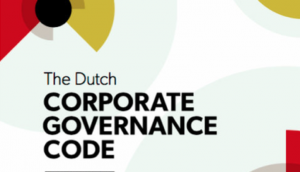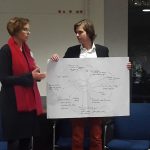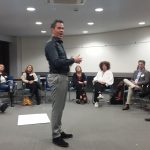 The Dutch corporate governance code was updated in 2016, placing long-term value creation at the forefront. But what defines long-term these days? And for whom should this value be created? Primarily for shareholders, for clients and other stakeholders, or for society at large? Therefore, sustainability is a very strategic topic for discussion in the boardroom. But are supervisory board members ready to have this conversation with the executive team? What is needed for the supervisory board to monitor performance on long-term value creation? A board member with sustainability expertise? Or has this been part of the board’s role and capabilities for years, requiring no changes in boardroom conversations?
The Dutch corporate governance code was updated in 2016, placing long-term value creation at the forefront. But what defines long-term these days? And for whom should this value be created? Primarily for shareholders, for clients and other stakeholders, or for society at large? Therefore, sustainability is a very strategic topic for discussion in the boardroom. But are supervisory board members ready to have this conversation with the executive team? What is needed for the supervisory board to monitor performance on long-term value creation? A board member with sustainability expertise? Or has this been part of the board’s role and capabilities for years, requiring no changes in boardroom conversations?
To answer these questions, I organized an event at Nyenrode Business University about supervisory boards and sustainability. A joint event hosted by the Nyenrode alumni circle for sustainability and the circle for supervisory board members. On November 21, 2017, a diverse group was inspired by top speakers and participated actively in roundtable discussions on the topic.
Inspiration for boardroom conversation
 Wouter Scheepens, the founder of Steward RedQueen, recently published a (Dutch) book Sustainability dynamics and dilemma’s in the boardroom. He wrote the book based on interviews with executives and supervisory board members of large companies in the Netherlands. “Boards are more aware of long-term value creation and sustainability than ever before. But it’s not clear whether that will really lead to a transition to a more sustainable economy. There is a lot of talk about integrated reporting in the boardroom, but what we really need is integrated thinking and integrated management. It’s nice to start a transition by harvesting the low-hanging fruit. Yet real change is all about managing the gain – and the pain. In the end, it requires focus, patience, leadership, and courage in all board members to transform the company.”
Wouter Scheepens, the founder of Steward RedQueen, recently published a (Dutch) book Sustainability dynamics and dilemma’s in the boardroom. He wrote the book based on interviews with executives and supervisory board members of large companies in the Netherlands. “Boards are more aware of long-term value creation and sustainability than ever before. But it’s not clear whether that will really lead to a transition to a more sustainable economy. There is a lot of talk about integrated reporting in the boardroom, but what we really need is integrated thinking and integrated management. It’s nice to start a transition by harvesting the low-hanging fruit. Yet real change is all about managing the gain – and the pain. In the end, it requires focus, patience, leadership, and courage in all board members to transform the company.”
Wouter advises the following topics to inspire the conversation in the boardroom:
- Development of an ambitious vision of society;
- Discussion about what the company really stands for: how the company will contribute to that vision;
- Dialogue with stakeholders and partners to understand the issues, explore joint solutions and translate these into action.
From isolation to familiar territory
Elfrieke van Galen is an experienced supervisory board member and an expert on sustainability. In addition to her role as partner at TheRockGroup, she serves on the supervisory board of several Dutch and international companies. “Sustainability usually isn’t a prominent topic in the boardroom. In reality, it is often left to the sustainability department, more often than not quite isolated from the core business. On the supervisory board, you also want to avoid that same isolation. Don’t appoint a sustainability specialist to the board and make that person solely responsible for the topic. That person may then get too much into detail and risk stepping into the role of the executive team. Only if that person also has good governance skills, can she or he keep the distance required and be a catalyst for the whole board to deepen their interest and help the company transform.”
Elfrieke adds the following tips to inspire the conversation in the boardroom:
- Travel to more familiar territory by integrating sustainability into risk assessment;
- Translate sustainability into more relevant terms like environment, people, responsible business conduct in the supply chain. And put sustainability on the agenda of the non-executive board once a year;
- Talk about whether the culture supports the vision and the mission of the company.
Topics for conversations in different roles

According to corporate governance codes and models, supervisory board members have three distinct roles: Advisor, Employer, and Supervisor. For the second half of the event, we split the group into subgroups to discuss how to integrate sustainability into these roles. Here’s a selection of what the subgroups presented back to the group:
In the advisory role, supervisory board members should ask lots of questions. Encouraging the creation of different perspectives through the engagement of client, partners and other stakeholders. The house of change model can be of help to help assess where individual board members and the organization as a whole stand regarding the integration of sustainability.

As the employer of the executive board, the members of the supervisory board should integrate sustainability into the hiring process. As well as into the goals and the reward systems. To support the integration of sustainability, supervisory board members should also ensure a good governance structure and a supportive culture are put in place. Including the creation of boardroom dynamics in which the executives feel safe to develop and execute a sustainability strategy.
In the supervisory role, board members should not just review financial results, but also the performance on non-financial topics. They should also review opportunity and risk assessments on relevant sustainability topics, as well as scenario analysis and the topics brought up by stakeholders in stakeholder dialogues. And ensure sufficient resources (financial and otherwise) are allocated to drive the transition to a sustainable business model.

A double reflection to surprise us all
Before the closing remarks, we were all treated to a musical performance by ZouZou, reminding us all that there’s more to the world than money. Professor André Nijhof then closed the evening with his appreciation of the new code and the discussions. The 2003 Dutch corporate governance code told board members to focus on serving shareholders only. So we’ve come a long way, yet still have a long way to go before we see integrated thinking and future-proof business models across the board.

A big thank you to the speakers Elfrieke, Wouter, and André; singer ZouZou; and all who shared their insights and fueled the debate. Many stayed to continue the conversation over a drink at the bar. The outcomes were a major step forward from a similar event in 2014, where we jointly concluded that sustainability belongs in the boardroom. At this recent event, we came to the same conclusion and provided actionable tips on how to do just that!
Written by Marjolein Baghuis (@mbaghuis) for the Nyenrode Alumni website and the Change in Context blog. To read about interesting people, book reviews and other posts about sustainability, change, and communications please subscribe to the Change in Context blog.

One Comment